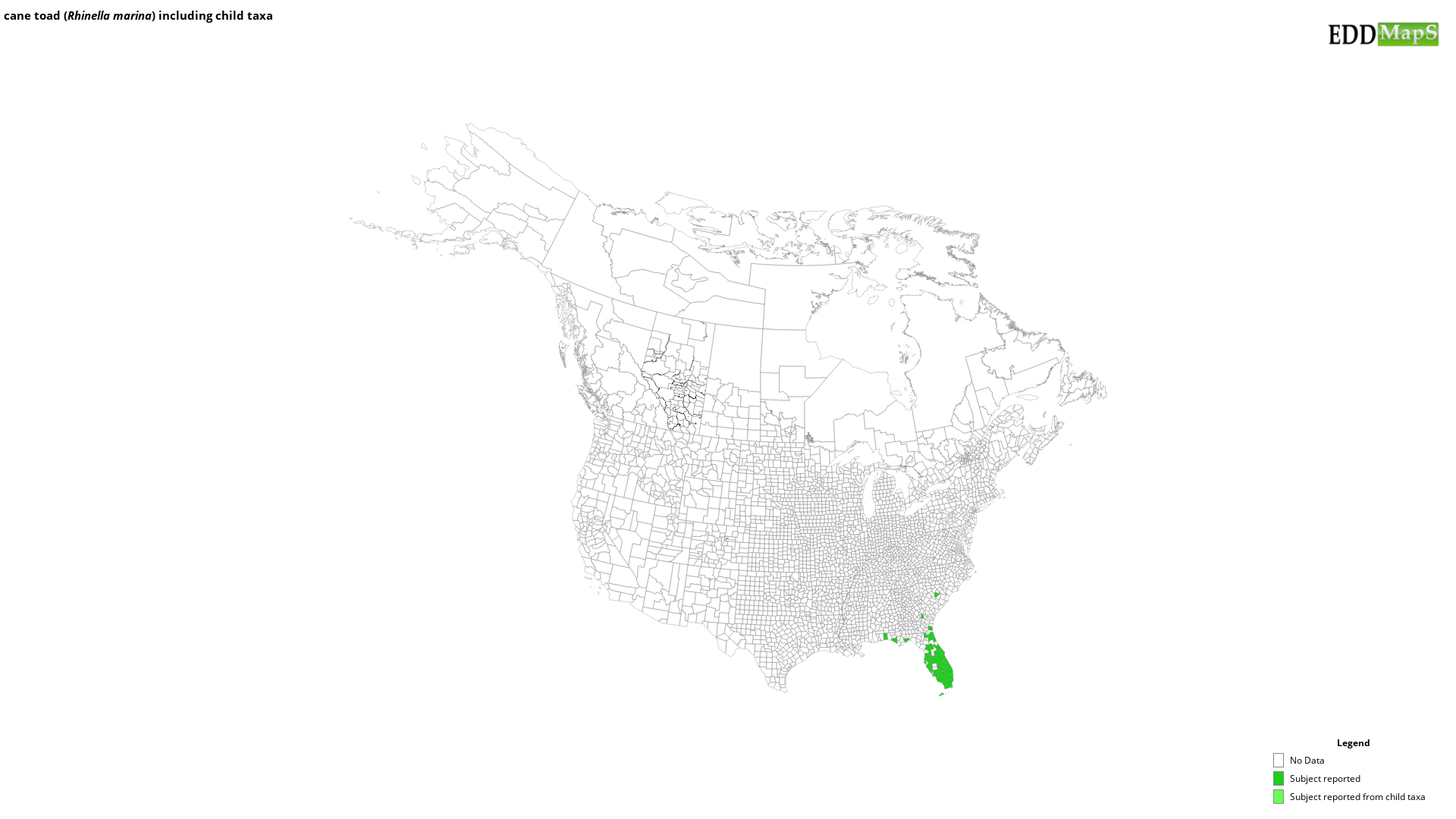cane toad
(Rhinella marina)
This species is Introduced in the United States
Origin
Rhinella marina is native to South America, Central America, and Mexico along with southern Texas. Cane toads have been introduced to northern Australia, islands throughout Oceania and the Caribbean, as well as Florida in the United States.
Life Cycle
R. marina are a large toad species typically 4-6 in. (10-15 cm) in length with warty skin that is tan to reddish-brown, dark brown, or gray in color. The back of cane toads is marked with dark spots. Voracious predators and highly adaptable, R. marina occur in various ecosystems but are particularly common in human-modified areas. In Florida, the invasive R. marina breed March-September. Males attract females by calling with a low-pitched, consistent, trill call. Eggs are laid 1-2 times a year in long strings with 8,000-30,000 eggs. Tadpoles hatch approximately 48 hours after eggs are laid. The time it takes for tadpoles to become toadlets is dependent on temperature and food availability.
Distribution
Initially introduced in Florida to control sugar cane pests, R. marina have also been intentionally and accidentally released by pet traders, zoos, and laboratories. Current breeding and expanding populations are found in central and south Florida.
Control Efforts
Cane toads are poisonous to humans and pets at all stages of life. Toxins can also irritate skin and eyes. It is recommended that handling of R. marina should occur with gloves and throughout washing hands afterward. Follow the University of Florida IFAS guidelines for humanely capturing and removing cane toads at https://edis.ifas.ufl.edu/uw432
https://ufwildlife.ifas.ufl.edu/frogs/canetoad.shtml
https://edis.ifas.ufl.edu/uw432
https://www.invasivespeciesinfo.gov/profile/cane-toad
Rhinella marina is native to South America, Central America, and Mexico along with southern Texas. Cane toads have been introduced to northern Australia, islands throughout Oceania and the Caribbean, as well as Florida in the United States.
Life Cycle
R. marina are a large toad species typically 4-6 in. (10-15 cm) in length with warty skin that is tan to reddish-brown, dark brown, or gray in color. The back of cane toads is marked with dark spots. Voracious predators and highly adaptable, R. marina occur in various ecosystems but are particularly common in human-modified areas. In Florida, the invasive R. marina breed March-September. Males attract females by calling with a low-pitched, consistent, trill call. Eggs are laid 1-2 times a year in long strings with 8,000-30,000 eggs. Tadpoles hatch approximately 48 hours after eggs are laid. The time it takes for tadpoles to become toadlets is dependent on temperature and food availability.
Distribution
Initially introduced in Florida to control sugar cane pests, R. marina have also been intentionally and accidentally released by pet traders, zoos, and laboratories. Current breeding and expanding populations are found in central and south Florida.
Control Efforts
Cane toads are poisonous to humans and pets at all stages of life. Toxins can also irritate skin and eyes. It is recommended that handling of R. marina should occur with gloves and throughout washing hands afterward. Follow the University of Florida IFAS guidelines for humanely capturing and removing cane toads at https://edis.ifas.ufl.edu/uw432
https://ufwildlife.ifas.ufl.edu/frogs/canetoad.shtml
https://edis.ifas.ufl.edu/uw432
https://www.invasivespeciesinfo.gov/profile/cane-toad
Resources
- Florida's Exotic Wildlife Species Detail - Florida Fish and Wildlife Conservation Commission
- Non-Native Aquatic Species in the Gulf of Mexico and South Atlantic Regions - Gulf States Marine Fisheries Commission
- Global Invasive Species Database - Invasive Species Specialist Group
- Nonindigenous Aquatic Species Database - U.S. Geological Survey
Selected Images
Maps
EDDMapS Distribution - This map is incomplete and is based only on current site and county level reports made by experts, herbaria, and literature. For more information, visit www.eddmaps.org
State Lists - This map identifies those states that have this species on their invasive species list or law.
Invasive Listing Sources
Taxonomic Rank
| Domain: Eukarya |
| Kingdom: Animalia |
| Phylum: Chordata |
| Class: Amphibia |
| Order: Anura |
| Family: Bufonidae |
| Genus: Rhinella |
| Rhinella marina |
References
Common Name Reference: Integrated Taxonomic Information System on-line database.
Scientific Name Reference: Integrated Taxonomic Information System on-line database.


